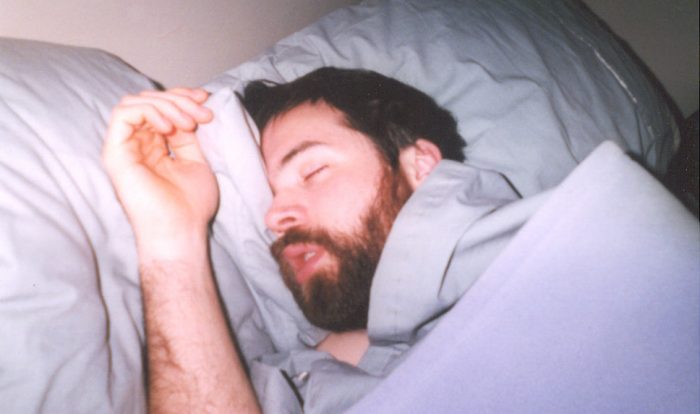Check out Elephant’s Continually-updating Coronavirus Diary. ~ Waylon
~
I don’t know about you, but I’ve been having a hard time falling and staying asleep lately.
I feel like the collective stress levels during these challenging times of the COVID-19 quarantine are higher than ever before, affecting more than just the sensitive souls.
While exploring various techniques and tricks to improve my own sleep hygiene, I have figured out these 10 tips that are helping me find my way back to better quality sleep.
You can try one, all, or mix and match—whichever ones sound more fitting for you:
1. Create a nighttime routine to help your system wind down.
We tend to thrive on routines once established, because they help our brains feel safer and our nervous system calmer. They say it takes 21 days (some argue it’s 40) to establish a good habit or a routine.
Rather than getting caught up with the correct number of days, you can get started with a nighttime routine and keep going for as long as it works for you. My nighttime routine includes switching my phone to airplane mode, having a cup of herbal tea under the stars while connecting with my partner, and a Yoga Nidra practice in bed.
2. Dim the lights after sunset—or, even better, use candles after dark.
Most light bulbs emit blue light, which can disrupt the circadian rhythms—which regulate our sleep cycle, supporting our overall bodily functions. Ideally, we would start to wind down after sunset and let our eyes self-regulate to the lower lighting. You can still continue your evening at-home plans and dim the lights, swap to a smart lighting system, or go old-school (and a lot cheaper) to candlelight after sunset.
3. Turn off all electronics at least an hour before bed.
Just as our house lighting after sunset disrupts the circadian rhythms, so do our LED screens. So, give your eyes some time to rest and adjust to low lighting before sleep. Aside from the not so positive effects of screen time, media consumption before bed can also stimulate the brain, which in turn can prevent it from quieting down to let you fall asleep.
4. Swap evening screen time for a good read or quality time with your loved ones.
Reading before bed actually helps your eyes get tired from the left to right motion, so they will want to close and let you fall asleep anyways. I recommend reading a light subject book, avoiding any deep science or intense fiction that can stimulate the mind.
If you live with others, you can also use this as quality time to connect with each other and reflect on the day. You could use something like the “Rose, Thorn, Bud technique” for identifying experiences from the day as positive, negative, or having potential.
5. Practice some gentle yoga before bedtime, such as Restorative yoga or Yin yoga.
You don’t even need yoga pants or a mat for this. PJs and your bed will work just fine.
Give yourself at least 15 minutes to breathe slowly, move slower, and release any stresses from the day that will not serve you through the night.
6. Roll out with a foam roller.
This is a type of self-massage that you can do to relax the muscles and help drain the lymphatic system. Don’t have a foam roller? Go DIY-style, using an empty metal water bottle. This is best done on a hard floor or carpet.
7. Take a warm bath with Epsom salts and essential oils by candlelight.
I feel like this does not need much explanation. Just treat yourself, and thank you later. I will add that if you run hot normally and sweat at night, consider rinsing with cool water after the bath.
8. Stop drinking any caffeine in the afternoon, and limit overall liquid intake near bedtime.
Drinking a small cup of herbal tea instead can help your system get calmer, and it provides an overall cozy effect. Limit the amount of liquids you intake near bedtime so you avoid waking up at night for the bathroom. With temperatures starting to get warmer in the spring, I like to drink my evening tea outside to keep cool. If you don’t have a backyard, simply open a window and listen to the evening symphony of night birds and crickets.
9. Journal anything lingering in your mind from the day and any to-dos for the next day.
This can look like a “brain dump” on paper or an organized to-do list. It doesn’t really matter what it looks like. Just give your mind a way to let go of any thoughts that would otherwise spin around as you try to fall asleep.
10. Practice a guided sleep meditation or Yoga Nidra (Yogic Sleep) right before bed.
This is one of my personal favorite bedtime practices. There are so many great options for Yoga Nidra. I love using the Insight Timer app, and I just published a Yoga Nidra meditation that you can listen to for free. I turn my phone on airplane mode and the screen brightness to the lowest level, leaving my phone facing down, so I don’t interact with it at all once I start the meditation.
~
How are you coping with stress during quarantine to maintain healthy sleep? Which of these tips do you find easiest to implement, and do you have any other ones to add to the list?
Feel free to share in the comments. I hope this helps you improve your sleep and overall well-being.
 Share on bsky
Share on bsky






Read 0 comments and reply